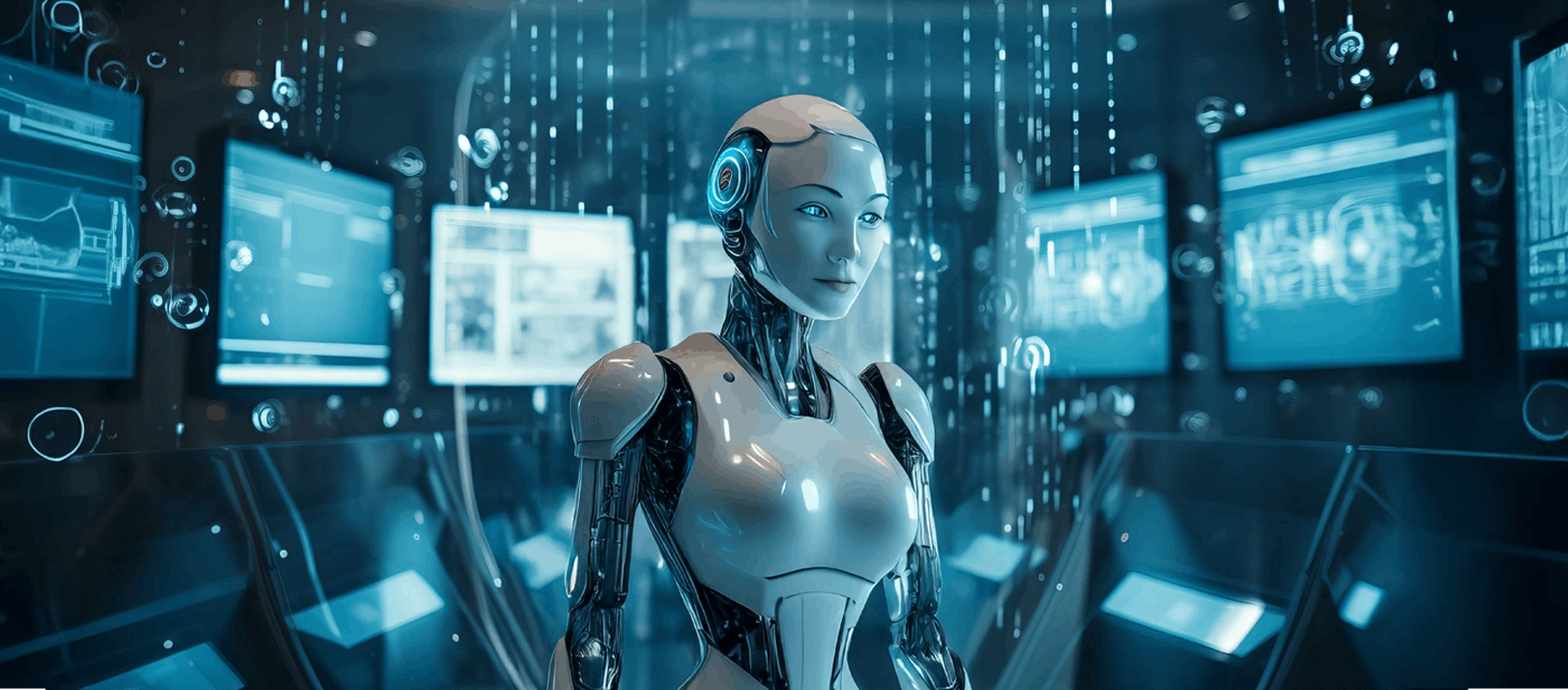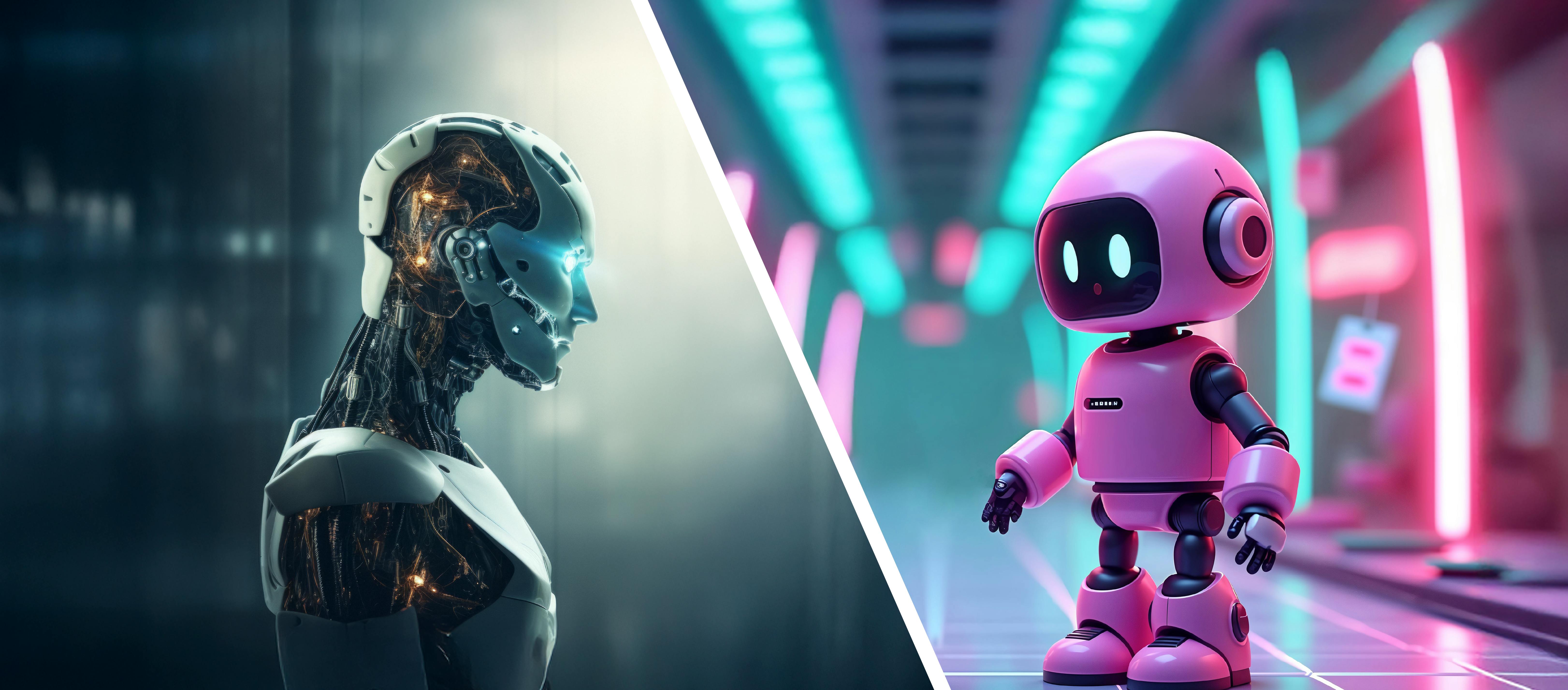
Choosing Between Chatbots and AI Agents, What Does Your Business Need?
AI agents and chatbots are something that we recently countered people discussing, mixing the two, which did not feel right, and hence, we decided to help people clear the air. As industry experts, we must let people know and understand the difference between AI agents and chatbots, essential in every marketer or business house's operations and functioning.
Chatbots and AI agents can talk to users, but is it really that simple? Well, don't worry; this article explores how AI agents and chatbots differ from each other and how AI agents transform various fields, going far beyond what regular chatbots can do.
In the following sections, we'll examine what AI agents and chatbots can do, see real-life examples of their use in various jobs, and help you determine which one might be right for your needs. Let's explore what is the best choice for you.
What is An AI Chatbot?
Imagine having software that can mimic human conversations with users, offering 24/7 availability and handling a high volume of basic conversational inquiries simultaneously, leading to rapid response times; this is what a chatbot is. These digital assistants are increasingly prevalent in customer service, efficiently handling high volumes of repetitive inquiries. Business owners use Chatbots to automate routine tasks, allowing human agents to focus on more complex issues.
The positive aspect of this innovative tool is its faith in predefined scripts and workflows to engage with customers. This allows them to quickly provide answers to common questions and guide users through basic processes. However, the scripted nature of chatbot interactions proves to be a double-edged sword. While effective for straightforward queries, chatbots often struggle with complex or delicate requests. This over-reliance on pre-programmed responses can make conversations feel robotic and impersonal. Chatbots may provide irrelevant answers or fail to assist customers with questions outside their limited knowledge base.
While chatbots excel at automating simple tasks, they complement rather than replace human support. Business owners should carefully weigh the pros and cons of implementing chatbots. Assess their specific business requirements first and then consider chatbots for customer service by striking the right balance between automated assistance and personalized human interactions in the age of AI.
What is an AI Agent?
Humanity's significant leap forward from traditional chatbots to an AI-powered chatbot is a modern-day AI agent. These agents offer a new level of sophistication, changing how digital interaction happens with agentic AI. Unlike their humble and more straightforward counterparts, these intelligent systems possess impressive abilities like decision-making, continuous learning, and solving ever-evolving complex narratives from every engagement.
AI agents are loyal digital assistants who respond to your queries and will adapt to your preferences, anticipate your needs, and handle all your complex tasks without breaking a sweat, along with thoughtful responses. That's the essence of an AI agent. These digital powerhouses can juggle multiple tasks across various domains, making them invaluable for businesses looking to provide top-notch, personalized experiences. What sets AI agents apart is their autonomy and flexibility. Rigid scripts or limited datasets do not bind them. Instead, they tap into vast knowledge bases, using advanced algorithms to make informed decisions. This capability allows them to tackle intricate problems and navigate changing scenarios easily.
In customer service, AI agents are game-changers. They can handle complex queries, understand context and details, and even detect human-like cues in a conversation. The adaptability of AI agents makes them suitable for a wide range of applications. As these AI-powered agents evolve, our digital experiences will be more intuitive, efficient, and personalized than ever before.
Key Differences: AI Agents vs. Chatbots
The artificial intelligence landscape is evolving rapidly, with AI agents and chatbots being the frontrunners of customer interaction technologies. Although often used interchangeably, they represent distinct approaches to automated communication. Here are the key differences that set Chatbots apart from their AI agent counterparts.
1. Contextual Understanding
The depth by which these conversational tools can interpret information by recognizing the circumstances, background, and intent in which it occurs. It involves understanding the words or phrases and the environment, situation, or setting that gives them meaning.
Chatbots typically interpret user inputs based on keyword matching or simple pattern recognition.
AI agents, however, employ sophisticated natural language processing (NLP) to grasp the nuances of human communication. They can remember previous exchanges, understand implied meanings, and even pick up on emotional cues—capabilities beyond traditional chatbots' reach. This enhanced comprehension allows AI agents to maintain coherent, context-aware conversations across multiple interactions.
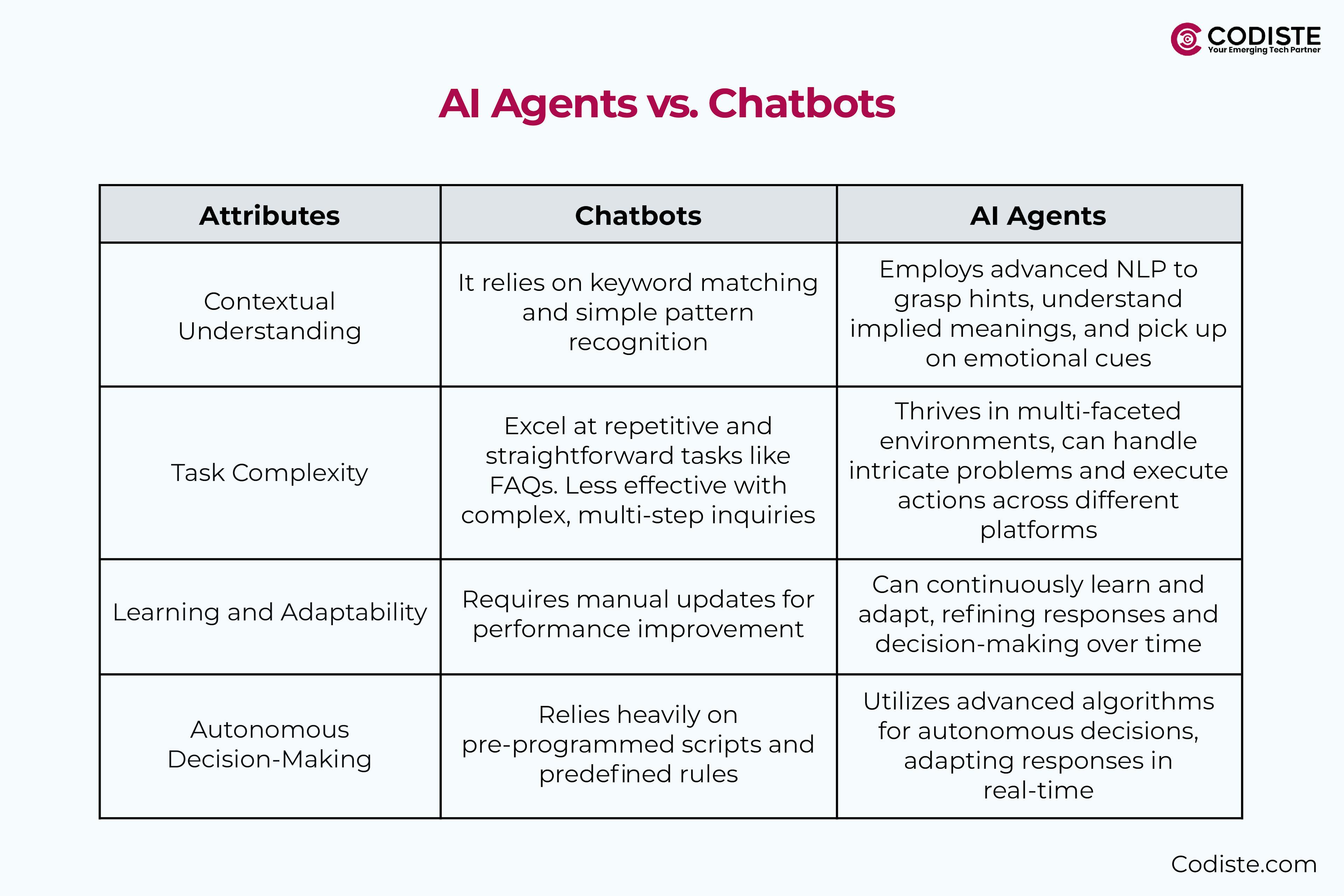
2. Task Complexity
The tasks that each communication tool can complete vary significantly. Chatbots excel at repetitive and straightforward tasks, such as answering FAQs or guiding users through simple processes, diminishing their effectiveness when faced with multi-step or open-ended inquiries.
On the other hand, AI agents thrive in multi-faceted environments, tackling intricate problems, breaking down complex tasks into manageable steps and executing actions across different platforms or systems.
AI agents are ideal for personalized advice, complex troubleshooting, or multi-stage customer support issues.
3. Learning and Adaptability
Chatbots require manual updates now and then to improve their performance.
AI agents are known for their capacity to learn and adapt continuously, taking something from each interaction and refining their responses and decision-making processes over time. This self-improvement capability makes AI agents more effective and efficient with continuous use, expanding their knowledge base and honing their ability to assist users.
4. Autonomous Decision-Making
The most significant distinction lies in decision-making. Chatbots are dependent on pre-programmed scripts, following predefined rules that navigate conversations.
Whereas AI agents utilize advanced algorithms to make autonomous decisions, allowing them to adapt their responses and handle complex queries in real-time, much like a human would. The level of autonomy by which AI agents can analyze the context, access relevant information, and formulate solutions makes them valuable in scenarios where flexibility and problem-solving are crucial.
Does Your Business Need Marketing AI Agents? To Know Further,
Choosing Between AI Agents and Chatbots
So comes the big question: what should you choose to implement, an AI agent or a chatbot for your marketing or business needs?
This decision can be significant for customer experience and your operations; hence, let's break down the key factors to consider.
- Evaluating your Specific Needs
When adaptability and meticulous decision-making are essential, AI agents excel in such environments. For Example - Imagine you're running a complex supply chain operation; in this case, AI agents could analyze multiple data streams in real time to optimize inventory and logistics.
Conversely, chatbots are ideal for efficiently handling straightforward and repetitive interactions like customer service FAQs or basic product inquiries, providing quick, consistent responses to common questions without being expensive. - Budgetary Constraints
AI agents come with advanced capabilities, typically having a higher price tag, a sophisticated infrastructure and requiring continuous maintenance. Meanwhile, chatbots are generally cost-effective to maintain and implement. A well-designed chatbot can easily automate customer interactions for small businesses or startups with limited resources. - Your Long-term Business Goals
Do you want to transform your entire customer service approach or need the basics, like some help with inquiries? An AI agent might be unnecessary if your needs are simple. However, a chatbot will be a wreck if you aim for advanced personalization and problem-solving assistance.
While chatbots may suffice for simple, routine interactions, AI agents offer sophistication and adaptability that can transform customer experiences.
The choice between an AI agent and a chatbot ultimately depends on the organization's specific needs and the tasks' complexity.
Codiste's Expert Tip to Help You Choose Between AI Agents or Chatbots
Remember, this isn't necessarily an either-or decision. Some businesses use both, implementing chatbots for front-line customer service and AI agents for more complex backend processes, but we will help you further simplify.
- Map out the tasks you want to automate and categorize them as simple or complex if most tasks are simple, lean towards a chatbot.
- An AI agent might be worth the investment if you deal with complexity and variability.
The key is aligning your choice with your unique business needs, resources, and aspirations.
Ultimately, whether you choose an AI agent or a chatbot, the goal is to enhance efficiency and improve customer satisfaction. Take time, research, and select the solution that best fits your organization's unique landscape.
Conclusion
As artificial intelligence evolves, the distinctions between chatbots and AI agents become more pronounced. This shift is reshaping how businesses interact with customers and streamline operations. Understanding these nuances is crucial for technical leaders and developers to harness AI's power in their organizations effectively.
The AI landscape is transforming rapidly, with AI agents emerging as sophisticated problem-solvers capable of handling complex tasks autonomously. Unlike traditional chatbots, these advanced systems can learn, adapt, and make real-time decisions, offering a remarkably human interaction level. AI agents are poised to revolutionize customer service, data analysis, and industry decision-making processes.
Tools that facilitate seamless AI integration and development efficiency are becoming indispensable, and the ability to quickly adapt and implement AI solutions will be a key differentiator for businesses.
The future of AI in business is not just about automation; it's about augmentation. For companies looking to integrate an AI marketing solution, Codiste stands at the forefront, offering a comprehensive platform for creating and deploying AI agents. By reducing development time from weeks to minutes and cutting infrastructure costs by up to 80%.


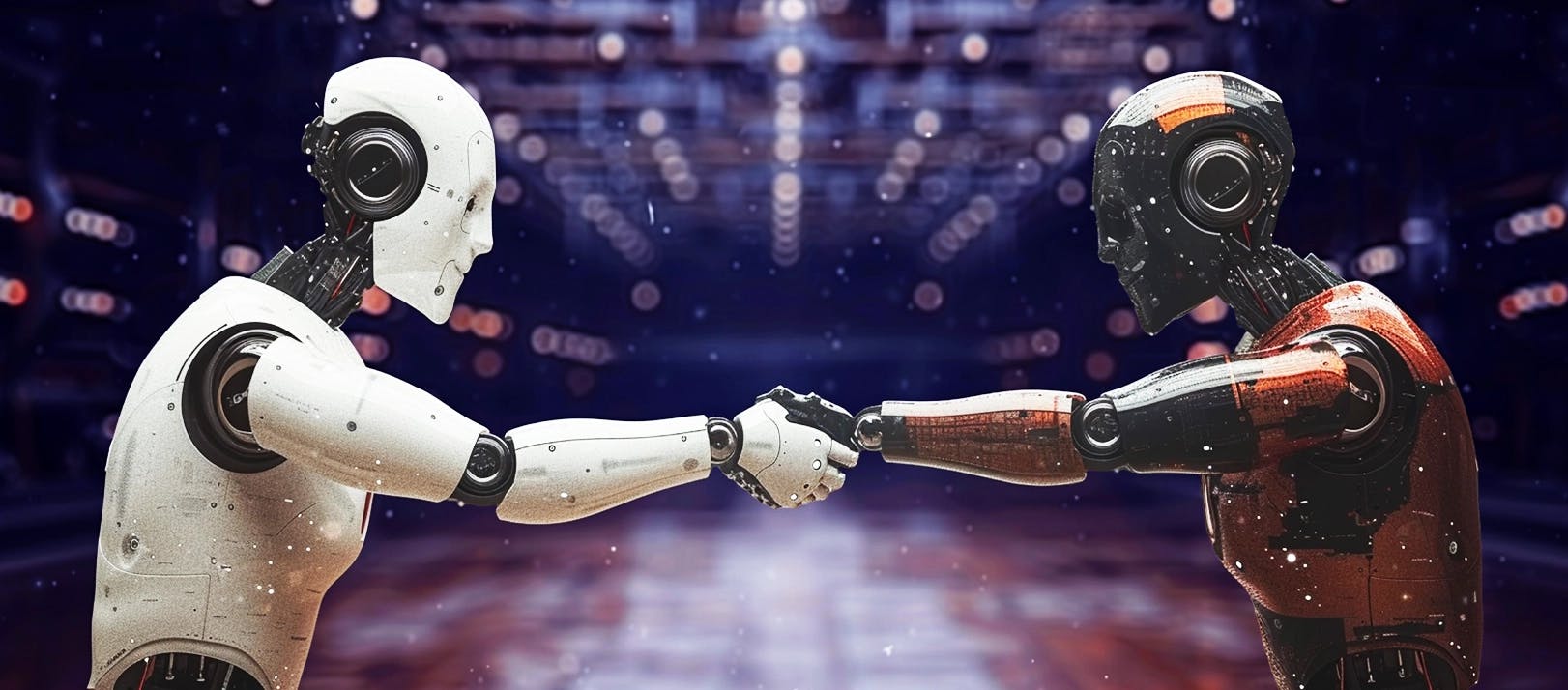
The Future of AI Automation: Agentic RAG...
Know more
The Role of Agentic RAG in the Search, D...
Know more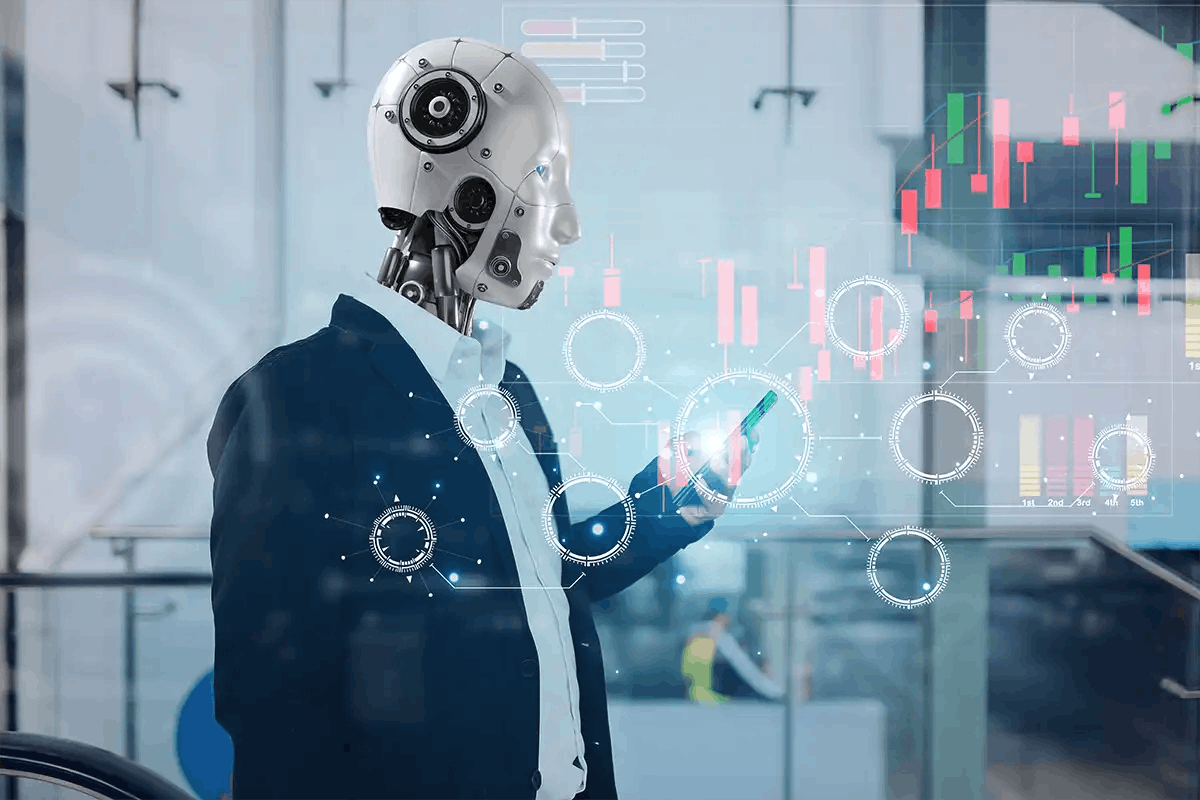
Is Business Process Automation possible ...
Know more